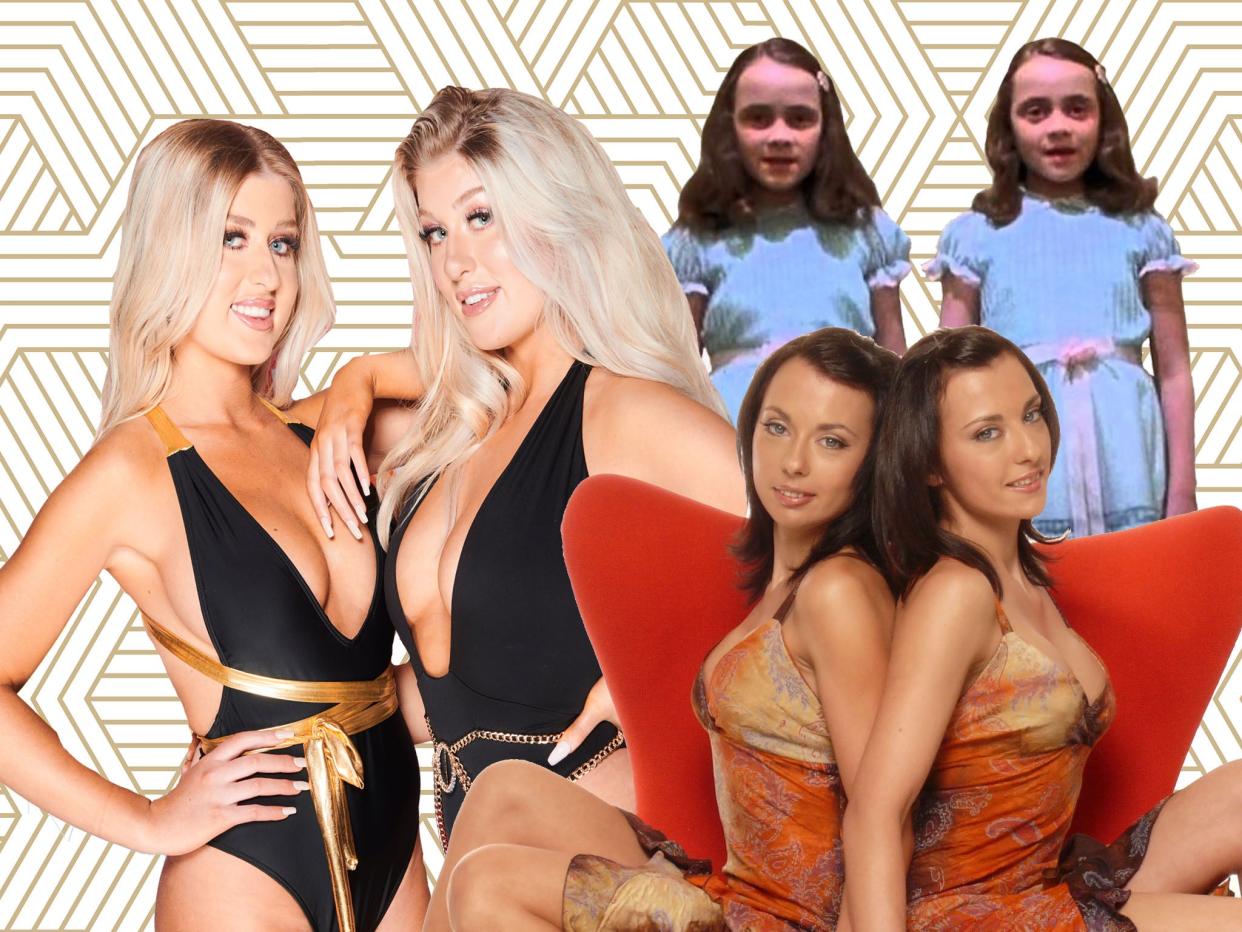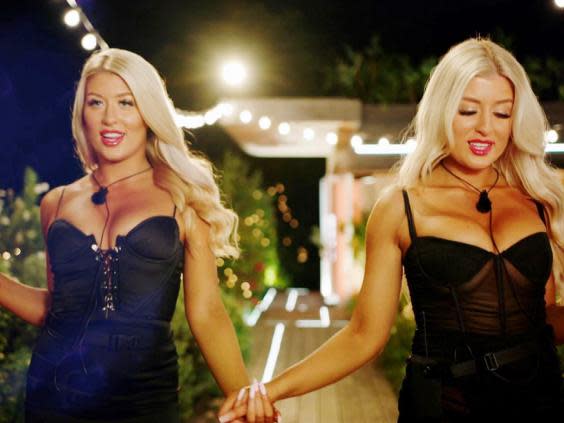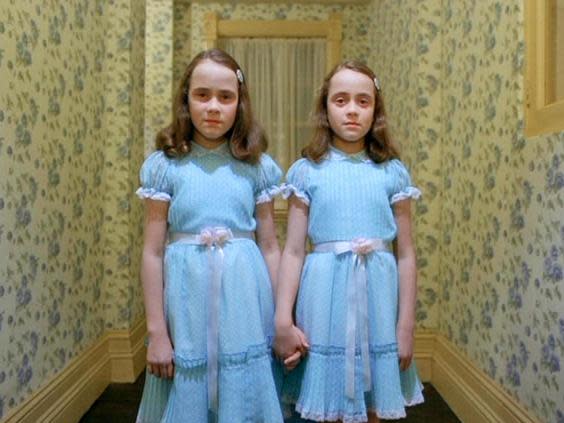Love Island: Why do we fetishise female twins — and how do real sisters feel about it

When Billie Ozturk walks down the street with her twin sister Jasmine Reynolds they regularly receive unsolicited sexualised comments. The 26-year-old from Essex remembers one occasion when a man passing in a car shouted: “Wonder if their boobs are the same?” and another time when a builder said audibly to his friend: “I'd love to have a set of twins in bed.” It isn’t just strangers who make comments, the sisters receive remarks in their dating lives too. One person asked Billie: “Why do you think your boyfriend went for you and not Jasmine?”
Often the sisters feel social pressure to laugh such comments off; but underneath they find them hard to deal with. While most adults are considered autonomous individuals, twins are regularly treated as two halves of a whole. This has the two-fold effect of making one twin forgettable (Billie worked in a pharmacy for two years before her sister but their manager still couldn’t tell them apart) while being treated as though they don’t have free will independent of each other. In short: they become a package deal.
On more than one occasion twins Kate and Simone, 37, from London, say men have approached them in a bar and said they don’t have a preference on which to talk to - they will take either. Although this did once lead to Kate dating someone - “he initially started chatting to my sister at a party, but she had a boyfriend at the time so she introduced us” - on the whole the sisters hate it. “We have been asked for threesomes on countless occasions. Once a man even offered to pay us. We had to highlight one too many times that it’s incest and f**king weird.”

When Love Island producers selected 20-year-old twins Jess and Eve Gale for the 2020 line-up they were playing into long-established ideas about twin sisters. And it didn’t take long for them to get the intended reaction. As the twins arrived fellow contestant Mike said: “Twice is definitely nice, you know what I mean?” and now-ex-Islander Ollie knocked over his drink in excitement.
Although viewers criticised the show for sending the sisters on double dates, dressing them in matching outfits and generally selling them as a buy-one-get-one-free deal (until Eve was voted out on 19 January), the fetishisation of the twins was seen as largely acceptable. But the thought of siblings flirting with each other in any other context, and then broadcast on primetime TV, would likely be reported to Ofcom.
Numerous adverts have used the figure of (almost always) female twins to sell products...
Dr Mattias Frey, University of Kent
The first recorded evidence of twins comes from around 300BC - a time when the arrival of two live babies would have understandably been perceived as something of a medical marvel. Twins have proven culturally fascinating ever since, appearing throughout Ancient Greek and Roman mythology (Apollo and Artemis, Eros and Anteros, Romulus and Remus, Castor and Pollux, Cassandra and Helenus); in the early 1900s when circuses still hired twins as a freakish double act, and in horror movies to depict the uncanny.
Today biology has made sense of multiple pregnancies. In recent years fertility treatments and IVF have increased multiple births. The NHS says in 2016 around 12,000 sets of twins were born in the UK (approximately 1 in every 65 births) compared to 1984 when twins accounted for just 1 in every 100 births. But the fascination persists.

Dr Mattias Frey, Professor of film and media at the University of Kent explains that popular culture is full of narratives of danger or wonderment “relating to twins or the 'double'”. He uses the example of early cinema using the doppelgänger as a storytelling device in films such as The Student of Prague (1913), The Golem (1915) or The Cabinet of Dr. Galigari (1919). “[They] depict a threat from the 'outsider' twin or fantasise about leading a double life apart from bourgeois constraints,” he says. Similar themes have persisted throughout cinematic history.
“The Shining (1980) and its hallucinatory rendering of two twin girls, is one of the most famous examples of the horrific potential of twins,” says Frey. Not forgetting photographer Diane Arbus’ photograph of identical twins Cathleen and Colleen, frequently described as haunting or creepy, or the disproportionate number of films and documentaries made about the Kray twins, Ronnie and Reggie.
But Frey says as well as being used to depict unease or horror, the ‘uncanny’ aspect of twins also fuels sexual fantasies. “Numerous adverts have used the figure of (almost always) female twins to sell products: for example, the infamous Doublemint gum twin adverts and their tagline jingle, 'a double pleasure is waiting for you'.”
This sentiment isn’t exclusive to fictional twins in adverts either: in 2012 real-life-twins and ‘Cheeky Girls’ Monica and Gabriela Irimia, who came to fame in 2002 on Pop Idol with their song “Cheeky Song (Touch My Bum)" appeared topless on the front cover of Nuts magazine wearing only thongs, spanking each other and pulling on each other's underwear.
Twin Fiona Baxter, 29, from London, whose sister Ali lives in Oxford, says that as a twin she finds this sort of imagery “particularly uncomfortable”. “How do people feel this kind of incest is acceptable? To some, it is as if twins are the same person so it makes it ok, but it’s totally not the case at all."
Psychotherapist Lucy Beresford, who specialises in sex and relationships, says the source of much of the twin fetishisation is the taboo of incest. “Sex with twins feels dangerous and thrilling, as well as exotic (by dint of being rare),” she says. Although this idea has been around for a long time the proliferation of online porn has made it far more visible and accessible in recent years, says Beresford. There are currently 1,700 videos on Pornhub labelled “twin”.
“Incest has never been, and probably never will be a socially acceptable sexual kink, yet, twins are,” says sex and relationship expert Annabelle Knight. “But, however you try and weigh it up, I’m afraid you can’t really have one without the other.”
Twins Hanneke and Lieke, 35, from the Netherlands, say they have seen this spill over from pornography into mainstream social media. “I recently came across an Instagram account called @datingtwins,” explains Lieke. “It was set up by the guy to boast how he is living “every man’s dream”, which you can also see from the comments. I don’t understand why people don’t think it’s disturbing he is dating two sisters?
"Maybe it has to do with twins featuring in Playboy or porn, but now it just has come to be something any may should want,” she says. Hanneke vividly remembers being made to stand next to her sister when they were 15 so they could be rated on their looks and similarity by a group of boys. “I hated that,” she says.
Sex columnist Tracey Cox warns that “in reality, just like with threesomes, most men would be terrified if their wish was granted”, so why does the concept of the fetishised twin continue on large platforms like an ITV2 show? Fundamentally Cox says that we are all interested in what it would be like to have another ‘you’ on the planet.
Clinical psychologist Hamira Riaz agrees, saying: “From a psychological perspective, our disproportionate fascination with twins taps into at least two complex and unresolved ‘big’ questions about what it means to be human.
“Firstly, the age old question of nature vs nurture – nowhere is this played out more compellingly than in the case of identical twins; the same genetic material, often the same early background, resulting in two distinct personalities and outlooks on life. Twins are a visible reminder of that. Secondly, twins live with the most extreme version of “duality” - being connected to someone else and feeling unique."
Some twins don’t mind the comparisons and there's big money to be made with twinning. YouTube channel, the Rybka twins, featuring sisters Sam and Teagan, has racked up 6.7m views on a video that purports to show the siblings communicating via “telepathy”.
Louise McCormack and her sister Karen Bell, 41, have also made a career out of it, starting a cabaret and jazz singing double act - Twin and Tonic. Although they have had similar questions to the other siblings (Louise’s husband has been asked: “Are they both yours?”) they’ve made peace with being seen as a package deal. “I guess we’re marketing ourselves that way,” she jokes.
Less than 24 hours after Eve Gale left the Love Island villa and returned to Britain, the remaining sister Jess confessed she was considering leaving too, as it “wasn’t going to be the same” without her twin. Only time will tell if removing the “twins” selling point means her romantic prospects have halved too.

 Yahoo News
Yahoo News 
